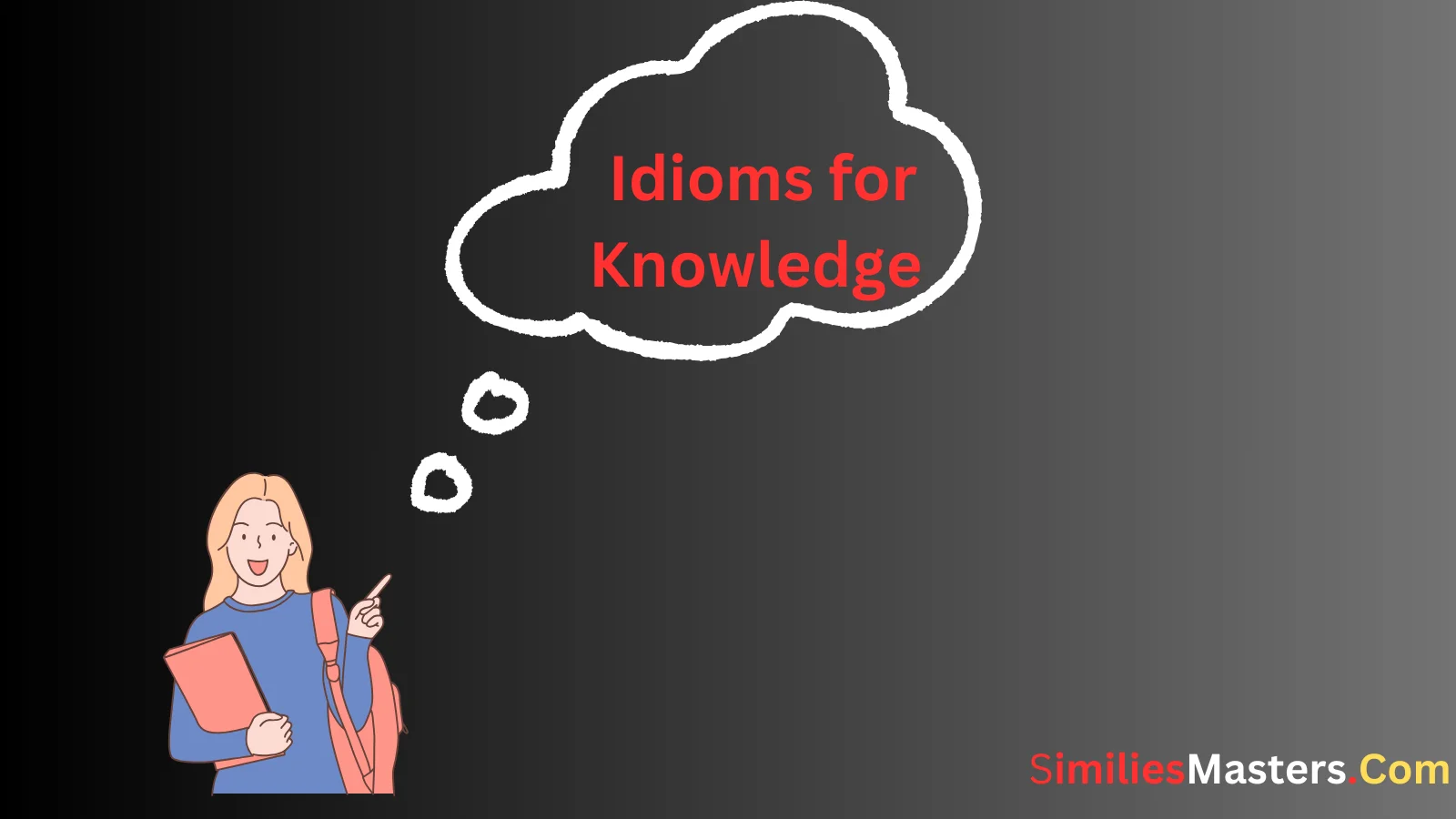Knowledge is a valuable asset that shapes our understanding, decision-making, and success. These idioms reflect different aspects of learning, intelligence, and wisdom in creative ways.
1. Knowledge is Power
Meaning: Having knowledge gives you an advantage.
Example: “She believes that knowledge is power, so she never stops learning.”
Tone: Motivational, wise.
Other ways to say it: Education is key, wisdom leads to success.
2. Learn the Ropes
Meaning: To understand how something is done.
Example: “It took me a few weeks to learn the ropes at my new job.”
Tone: Encouraging, instructional.
Other ways to say it: Get the hang of it, master the basics.
3. Hit the Books
Meaning: To study hard.
Example: “I need to hit the books before my big exam.”
Tone: Serious, academic.
Other ways to say it: Study hard, cram.
4. A Walking Encyclopedia
Meaning: Someone who knows a lot about many topics.
Example: “Ask Jake anything about history—he’s a walking encyclopedia!”
Tone: Impressed, complimentary.
Other ways to say it: A know-it-all, a fountain of knowledge.
5. Read Between the Lines
Meaning: To understand hidden meanings.
Example: “She didn’t say it outright, but if you read between the lines, she’s unhappy.”
Tone: Insightful, observant.
Other ways to say it: Catch the subtext, understand the deeper meaning.
6. Know the Drill
Meaning: To understand the routine.
Example: “You don’t need instructions; you already know the drill.”
Tone: Confident, experienced.
Other ways to say it: Be familiar with, have experience in.
7. Food for Thought
Meaning: Something that makes you think.
Example: “His speech gave me a lot of food for thought.”
Tone: Reflective, intellectual.
Other ways to say it: Something to consider, a thought-provoking idea.
8. The School of Hard Knocks
Meaning: Learning through difficult experiences.
Example: “He didn’t go to college, but he learned business from the school of hard knocks.”
Tone: Tough, real-life wisdom.
Other ways to say it: Learning the hard way, life lessons.
9. Sharp as a Tack
Meaning: Very intelligent and quick-witted.
Example: “Grandpa may be old, but he’s still as sharp as a tack.”
Tone: Complimentary, admiring.
Other ways to say it: Quick thinker, bright.
10. Can’t Make Heads or Tails of It
Meaning: Unable to understand something.
Example: “This math problem is so hard, I can’t make heads or tails of it.”
Tone: Confused, frustrated.
Other ways to say it: Completely lost, can’t figure it out.
11. Keep Your Ear to the Ground
Meaning: Stay informed about what’s happening.
Example: “If you want to know about job openings, keep your ear to the ground.”
Tone: Attentive, proactive.
Other ways to say it: Stay updated, be aware.
12. Lightbulb Moment
Meaning: A sudden realization.
Example: “I had a lightbulb moment and finally understood the solution.”
Tone: Excited, insightful.
Other ways to say it: A-ha moment, sudden clarity.
13. Put on Your Thinking Cap
Meaning: Focus and think carefully.
Example: “We need to solve this problem, so put on your thinking cap.”
Tone: Encouraging, creative.
Other ways to say it: Brainstorm, think deeply.
14. A Little Knowledge is a Dangerous Thing
Meaning: Knowing only a little can lead to mistakes.
Example: “He thinks he’s an expert, but a little knowledge is a dangerous thing.”
Tone: Cautionary, wise.
Other ways to say it: Overconfidence is risky, partial knowledge misleads.
15. Think Outside the Box
Meaning: Be creative and innovative.
Example: “To solve this issue, we need to think outside the box.”
Tone: Inspirational, creative.
Other ways to say it: Be original, approach differently.
16. Get Something Down to a Science
Meaning: To master something completely.
Example: “She’s got time management down to a science.”
Tone: Confident, professional.
Other ways to say it: Be an expert, perfect a skill.
17. Brainstorming Session
Meaning: A meeting to generate ideas.
Example: “We had a brainstorming session to find creative solutions.”
Tone: Collaborative, creative.
Other ways to say it: Idea meeting, creative discussion.
18. Common Knowledge
Meaning: Something widely known.
Example: “It’s common knowledge that exercise improves health.”
Tone: Neutral, factual.
Other ways to say it: General knowledge, well-known fact.
19. Brush Up On
Meaning: To refresh your knowledge of something.
Example: “I need to brush up on my Spanish before the trip.”
Tone: Practical, self-improving.
Other ways to say it: Review, refresh skills.
20. Fill in the Blanks
Meaning: To provide missing information.
Example: “I missed the meeting, so can you fill in the blanks for me?”
Tone: Informal, informative.
Other ways to say it: Give details, update me.
21. Street Smart
Meaning: Having practical knowledge, especially about life.
Example: “She’s not book smart, but she’s definitely street smart.”
Tone: Experienced, worldly.
Other ways to say it: Life-savvy, practical wisdom.
22. Wise Beyond One’s Years
Meaning: Someone young who has great wisdom.
Example: “At just 15, he’s wise beyond his years.”
Tone: Admirable, mature.
Other ways to say it: Mature for one’s age, an old soul.
Conclusion
Knowledge comes in many forms, from book smarts to life experience. These idioms capture the essence of learning, wisdom, and intelligence in creative and meaningful ways.



